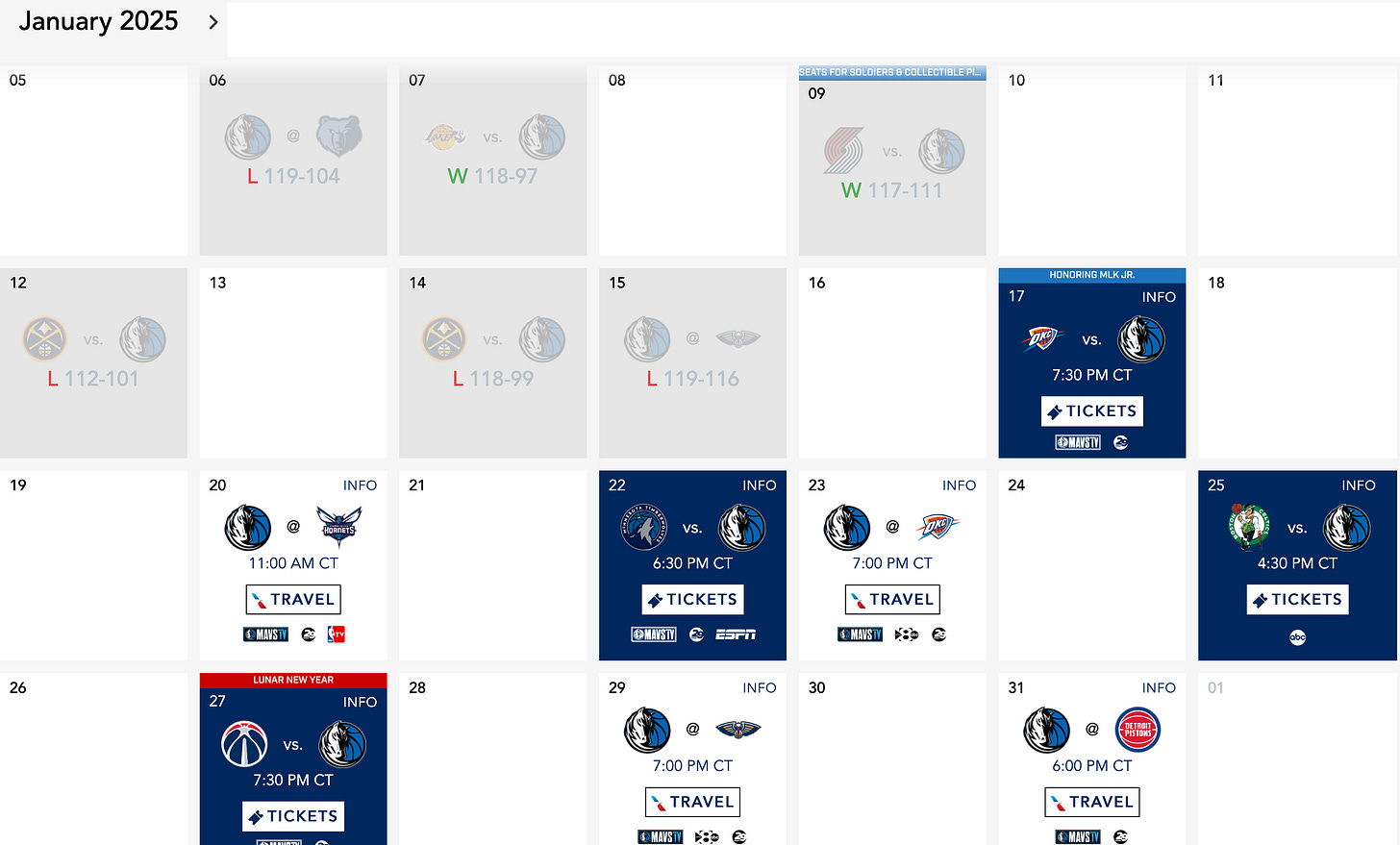Mavs Game Observations: Game 41 @ Pelicans
Another opportunity blown on a missed call...and bad process
Most of the talk about this game will be about the missed goaltending call that cost the Mavericks the game. And it should be, because it's a terrible way to lose, a tough blow for a limping team that didn't need another kick while already stumbling.
However, there should also be some discussion about how the Mavericks found themselves in that position, trailing with less than ten seconds to go and ultimately losing 119-116 to the second-worst team in the NBA. The simplest explanation is that Jason Kidd’s squad was without three of its best players: Luka Dončić, Kyrie Irving, and Dereck Lively II.
While their absence doesn't make the Mavericks a favorite even against a bad team like New Orleans, the reality is that, much like the first matchup against Denver a few days ago, they squandered another opportunity to catch a break, win a game, and stop some of the bleeding in the standings.
And looking ahead at the schedule, there won’t be many more breaks in the next five games, with the lone exception being a matchup against the Hornets…
Today’s notes:
Missed call masks bad defense and fourth-quarter collapse
High-pace battle of who'll make fewer bad decisions
Another night, another guard lighting up the Mavericks
Another ISO ball heavy clutch breakdown
Daniel Gafford’s career night
Bonus point: Jaden Hardy’s scoring and minutes
1-Missed call masks bad defense and fourth-quarter collapse
My gripes with the Mavericks' defense during the injury-marked stretch since Christmas have become an ongoing theme, to the point where it is no longer surprising but just disappointing.
The Mavericks started the game much like they did in their last matchup against Denver—with low energy, minimal force, and no defensive disruption, allowing the Pelicans to score easily out of pick-and-roll on their first three possessions.
The Mavericks allowed 33 points in the first quarter, 63 by halftime, and 119 by the end of the game to what is, at best, a below-average offensive team. And when it mattered most, the issues I’ve been highlighting over the last two days surfaced again (more on that in my third point).
2-High-pace battle of who'll make fewer bad decisions
The total points and poor defensive numbers are skewed because the game was played at a very high pace. Neither team could score efficiently against a set defense, so both tried to push the pace. It turned into an up-and-down game that was hard to watch at times—a matchup of who would make fewer mistakes and bad decisions. And unfortunately, the Mavericks didn’t.
Dallas committed nearly half of their 15 turnovers in the first quarter, digging an early double-digit hole that forced them to play catch-up for most of the night. Nine of the 15 turnovers came on bad passes, most of which were simple post or inbound entry passes rather than complex reads attempting to beat the defense. Bad passes led to too many easy transition points for the Pelicans, who held a 23-17 edge in transition scoring—a crucial difference in a game decided on the final possession
Decisively losing the turnover battle, combined with the Mavericks' inability to dominate the rebounding game against one of the league's weaker rebounding teams, left them with a seven-shot deficit in total field goal attempts despite an almost identical free-throw rate. Seven fewer shots in a tightly contested game between evenly matched teams ultimately cost them the win.
3-Another night, another guard lighting up the Mavericks
Yesterday, I wrote extensively about the Mavericks' perimeter and point-of-attack defensive issues, highlighting a long list of primary ball-handlers who have shot well above their season averages against the team this season. Dejounte Murray is another name to add to the list, joining his namesake Jamal, who also recorded a season-high scoring output against Dallas in the previous game. Dejounte scored 30 points on a 55 percent effective field goal rate, 11 percentage points higher than his season average.
While much of the talk after the game centered around Jason Kidd's trust in Spencer Dinwiddie and his reliance on ISO ball (see next point), his trust in the 31-year-old guard on the defensive end is even more baffling. Dinwiddie logged 38 minutes and was tasked with guarding Murray for most of the night, while Quentin Grimes played just 18 minutes. Murray took over in the fourth quarter, as the Pelicans repeatedly ran the same double-screen action for him at the top of the arc on every possession down the stretch. He ended up scoring 13 points and missing only two shots in the quarter. To be fair, Murray also torched P.J. Washington, who was tasked with defending him on a couple of late possessions, but it’s difficult to contain any NBA player who has already found their rhythm and confidence earlier in the game.
4-Another ISO ball heavy clutch breakdown
Keep reading with a 7-day free trial
Subscribe to digginbasketball to keep reading this post and get 7 days of free access to the full post archives.




